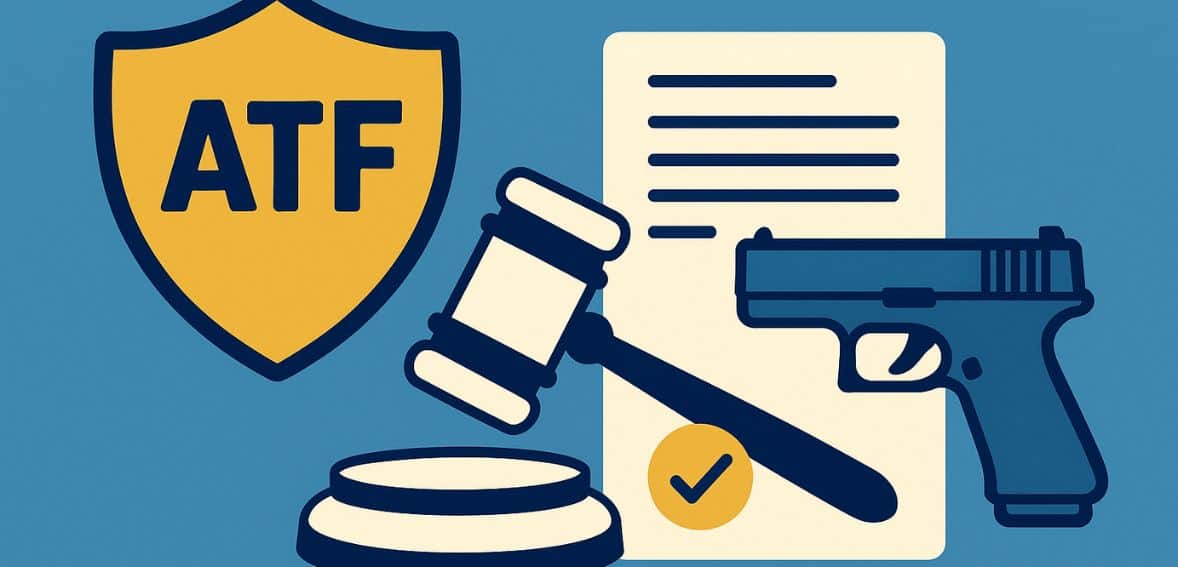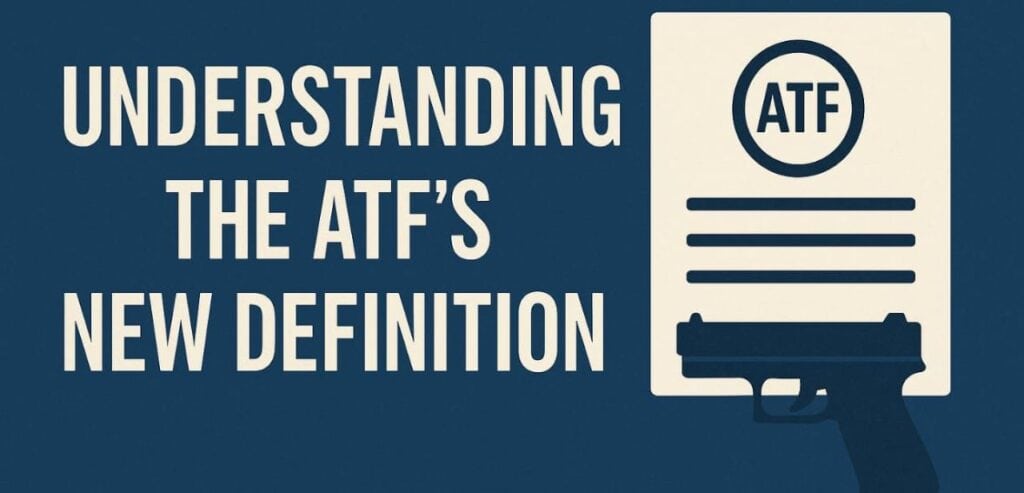
By alphacardprocess July 3, 2025
For anyone holding a Federal Firearms License (FFL), keeping up with the latest ATF rules isn’t just good business sense—it’s essential to avoid legal and financial pitfalls. The Bureau of Alcohol, Tobacco, Firearms and Explosives (ATF) has redefined what it means to be “engaged in the business” of dealing firearms, which is one of the most significant changes in recent years. This change has an immediate impact on how FFL dealers receive and handle payments in addition to having ramifications for inventory, background checks, taxes, and reporting.
The ATF expanded the definition of being “engaged in the business” to include regular, consistent sales, even if they barely make the wholesale or manufacturing thresholds, in late 2024 and early 2025. Credit card networks now view many FFL dealers as higher-risk merchants under this new interpretation, despite the policy change’s original goal of plugging holes and reducing loosely structured commercial operations. As a result, FFLs have been forced to reevaluate their point-of-sale (POS) systems, increase merchant fees, and hinder transaction flows.
This article explores the redefinition of the ATF, the reactions of financial networks, the compliance requirements that FFLs must follow, and useful tactics for handling payment difficulties. In the end, FFL dealers—from tiny pawn shops to large outdoor retailers—should comprehend not only the changes in the regulatory content but also how to set up payment processes to stay safe, economical, and completely compliant.
Understanding the ATF’s New Definition

In the past, selling firearms with the primary goal of sustaining one’s livelihood and ongoing business activity was considered to be “engaged in the business.” In the past, this required regular transactions, recurring purchases, and profitable sales. ATF released new interpretive guidelines in 2024 to clarify the standard, but in reality, they expanded it.
These days, even someone selling a handful of firearms could fall under the ATF’s updated definition of a dealer, particularly if they sell firearms more frequently than not or advertise as such. For example, a private individual may now be considered “engaged in the business” if they sell five or more firearms annually or post about themselves on the internet.
If you’re new to the process, understanding how to obtain an FFL license is critical before navigating compliance obligations. Anyone who doesn’t meet the redesigned criteria is still a private seller who isn’t involved in the trade.
Notably, the redefinition expands regulation by unintentionally moving some formerly casual sellers into the licensed category without increasing license fees. Although the regulatory change was made with the direct goal of enforcing consistent compliance, it also had unanticipated downstream effects, chief among them being a shift in the perception of FFL merchant activity by banks and card networks.
Why Payment Processors Now Require Tighter Oversight

Card networks evaluate businesses using risk tiers, assigning each one a Merchant Category Code (MCC). They also analyze how payments flow in the business to flag any unusual activity patterns. Many FFL dealers are now classified as elevated risk under the new ATF interpretation. Tighter scrutiny, manual reviews, and possibly the blocking of specific card types result from this.
If processors identify unusual settlement patterns, such as accepting recurrent large transactions or switching between small and large ticket firearms, dealers may face higher declines, surcharges, or account holds. Card networks have responded to the ATF’s jurisprudential shift with updated compliance queries, enhanced diligence, and anti-fraud mechanisms rather than with legal policy.
Many FFL dealers are now being asked to complete extra paperwork by payment processors—far more than what used to be the norm. Previously, filling out these forms by hand was standard procedure; however, these days, processors require verified FFL documentation, ATF confirmation, and insurance disclosures. Some nontraditional FFLs, such as private collectors who have switched to casual selling, might encounter high rates and reserve requirements, or processors who are reluctant to activate accounts.
Shipping, E-Commerce, and Payment Integration Impacts

Many FFL operations have been impacted by the e-commerce trend, particularly in the wake of the pandemic. More FFL dealers are embracing e-commerce tools like virtual terminals and online catalogs to keep up with customer expectations. Cardiovascular signals for card networks tighten as a result of the ATF’s redefinition: an increase in nascent online gun sales, whether they occur on a daily, weekly, or irregular basis, could result in fraud alerts or elevated compliance flags.
New internal workflows have been implemented by payment processors. Some payment systems now ask for extra paperwork, like an FFL license, an ATF compliance letter, or even a screenshot from your website showing clear compliance wording. For products that need legal purchase documentation, some processors have begun using targeted risk profiling.
During remote verification steps, FFLs with POS integrations have reported encountering difficulties. Even if the dealer had a valid license, some dealers experienced disruption in early 2025 when their cards were declined for “suspicious merchant activity.” Processors clarified that these results from inaccurate industry declarations, misclassified MCCs, or geolocation discrepancies. Manual escalations, document submission, and temporary backups like check/cash workflows are frequently required to fix these.
How Dealers Can Prepare Their Payment Systems
For FFLs to preserve payment access, develop resilience, and remain cost-effective, they should proactively adjust systems as follows:
Start by updating how your business is described to payment processors. Make sure to include copies of your license and the words “Federal Firearms Licensed Dealer” in all sign-up forms when obtaining merchant services. Providing resolution letters, your e-commerce disclaimer, and a snapshot of your AFT G-26 Doc Page may be wise. By alerting processors in advance, the possibility of unexpected account holds or significant transaction declines is decreased.
Many FFLs are also turning to mobile payment tools to enable flexible, secure transactions at shows, ranges, or remote locations. Certain point-of-sale systems reconcile ATF form 4473 data, automate license validation, and attach system logs for FBI NICS check timestamps. Giving processors access to these documents creates a more robust compliance history and vetting process.
Third, look into ISV gateways with underwriting tailored to firearms. In 2025, a few specialized financial firms are vying for FFL business; they frequently provide lower reserves, simpler onboarding, and knowledge of ATF audit schedules. Get quotes from these specialized providers if your current processor is slow or overpriced.
Transaction Structuring and Batch Settlement
Merchant profile risk can also be decreased by batch timing and settlement arrangements. Some FFLs divide batches into firearms-validated batches and accessory batches rather than submitting firearms and accessories as a single mass transaction. This soft-splits volumes, allowing processors to more easily reconcile firearm sales against compliance records and allowable thresholds, while still ultimately routing through the same account.
Timing batch settlements carefully—such as avoiding late-night spikes—can help keep your account from being flagged. Although this is not a foolproof method, you can prevent attention-grabbing spikes by combining it with a well-documented transaction pattern.
The establishment of sub-merchant accounts under a central ATF-licensed holding company, which is similar to sub-ISOs in the card industry, is another new strategy. This allows dealers to separate sales of high-risk firearms while channeling e-commerce or accessory transactions through a centralized, law-abiding legal entity. This method lowers exposure and provides better risk partitioning, but it requires legal coordination.
Staying Compliant with Ongoing Requirements

Staying compliant isn’t something you do once and forget—it’s an ongoing part of running a legitimate FFL business. Verifying that you are properly handling firearms and conducting business as an FFL is of interest to both credit networks and ATF auditors. This entails maintaining up-to-date records, submitting Form 4473s on time, renewing your license, and promptly answering ATF questions.
On the payments side, expect to share updated documents from time to time in the form of resolution letters, merchant statements, or an audit trail from your point-of-sale system that links firearm serial numbers to receipts. A yearly recertification or proof of current liability insurance may be required by certain processors.
Maintaining your e-commerce site’s compliance with ATF policy is equally important. Show NFA-line disclaimers, integrate background check status fields, and direct buyers to couriers approved by ATF (such as licensed dealers for transfers). This reduces chargebacks flagged as “unauthorized transaction” or misrepresentation.
Costs, Fees, and the True Price of Compliance

Higher merchant prices are one effect of this regulatory tightening. 2025 has seen an increase in the use of reserve formulas, holdback rates, and monthly compliance fees. FFL dealers already pay more than the average retailer—but recent rule changes may push those fees even higher.
Asking your provider to break down these expenses into individual costs is your best bet. The processor should separate these fees from interchange if they have embedded compliance obligations, such as reserve provisioning, heavyweight support, and due diligence. Cost-benefit analysis is made possible by transparency, and if your fees significantly outweigh averages, those specialized carriers may provide cost savings—even after deducting licensing fees.
What This Means for the FFL Landscape
Many lower-volume dealers now operate under higher risk thresholds as a result of this change, which was caused by both the ATF definition and the card network’s response. This may put pressure on small businesses and casual sellers, making them rethink public sales, switch to selling only accessories, or stop doing business online.
High-volume, compliant FFLs, on the other hand, who have the infrastructure to support contemporary POS, separation accounting, and compliance procedures, gain from it. Larger businesses will probably be able to handle these changes, but mid-tier dealers will need to decide whether to partner or upgrade their systems or risk losing their payment credibility. When you’re licensed and organized, processors are more likely to see you as a trusted partner instead of a potential risk.
Conclusion
Beyond license eligibility, the ATF’s reinterpretation of “engaged in the business” has significant ramifications as it has changed the payments environment for FFL dealers. FFLs are now subject to both transactional scrutiny and regulatory requirements as a result of card processors interpreting their due diligence modifications into risk thresholds.
By proactively aligning merchant disclosures, optimizing transaction structure, upgrading POS, and utilizing specialized underwriting, dealers who encounter increased declines, higher fees, and compliance gating can reduce risk. Although it’s normal to feel challenged by these changes, early adopters will probably benefit from improved rates, more trust from regulators and financial partners, and smoother merchant relationships.
Transparency is fundamental: allowing your legal status, permissions, and point-of-sale operations to openly correspond with processor expectations. Being an FFL is more than just a license in this day and age; it’s a public declaration to your bank, processor, and clients that your company is reliable and authentic. This degree of clarity guarantees that your payment systems will continue to be flexible in the future and safeguards your reputation.